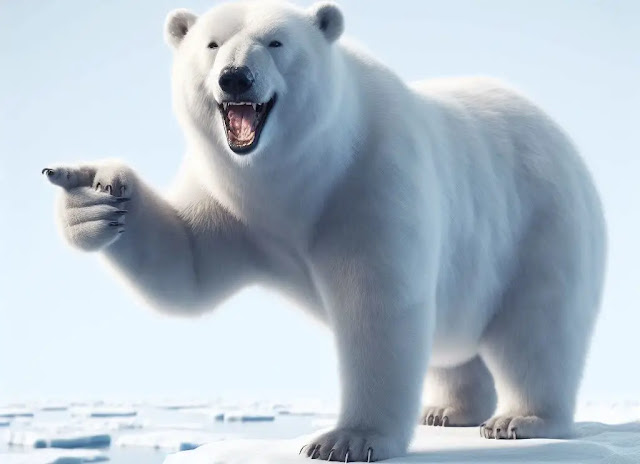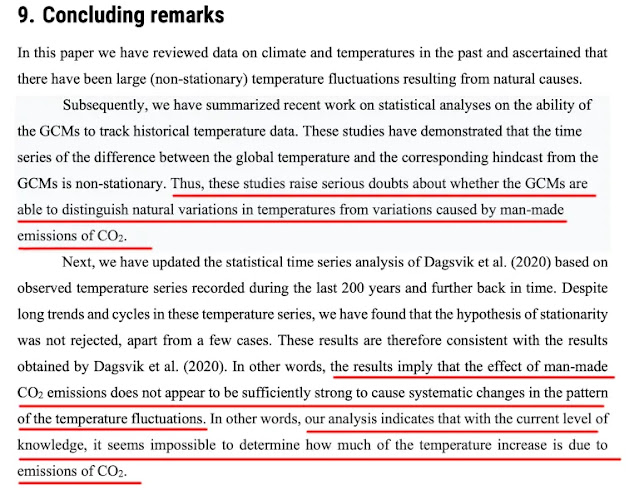“RUN AWAY MELTING” IS AN IPCC EMBARRASSMENT
It’s been over 15-years since the release of the IPCC’s AR4 report which called for “run away melting” of Arctic sea ice. This bold proclamation, devised from a baseless extrapolating of a few ‘bad’ years, will be the ruin of the agency.
But for the odd cherry-picked shrill, corporate media outlets have been paying little attention to Arctic sea ice in recent years, Greenland less still.
This is despite the IPCC’s AR4, released in 2007, instructing the world that Arctic sea ice was “the canary in the coal mine”, i.e. the harbinger of the catastrophic changes happening to the climate system and the result of human’s hand.
The NSIDC maintains a very instructive and useful interactive graph, writes Greg Goodman for judithcurry.com.
Since the September minimum is the most volatile sea ice reading it was adopted as a favorite metric by the climate cabal. The year 2007 provided the media with the lowest summer sea ice extent in the (relatively short) satellite record. Al Gore leapt on the findings, famously saying that scientists (unnamed) had told him there may be no more summer ice at all as early as 2013.
The alarmists collectively spat their Kahlua Coffee Floats out when 2012’s September minimum came in even lower, and lamented climate change as being “worse than we thought” and promoted claims that the Arctic was in now a “death spiral”.
More than a decade has now passed since those ‘death spiral’ caterwaulings.
How has Arctic sea ice fared?
How bad has it gotten, dare I ask?
Arctic sea ice extent (areas with less than 15% ice coverage)
Oh…
‘Albedo feedback’ was cited as the ‘tipping point’ mechanism that would soon bring about an ice free Arctic, whereby less ice leads to more solar energy entering the sea, warming the waters, leading to more ice melting, meaning more solar energy entering the seas, warming the waters, leading to more ice melting, etc. etc.
This explanation, while plausible, is of a naive simplicity that exposes the darker intents of the ‘global boiling narrative’. The IPCC can’t be this stupid, organically. This hypotheses fails –refuses, even– to examine the many other effects increased bodies of open water may have and what other feedbacks, positive or negative, may come into play, including:
* More conductive heat loss since the ice was a good insulating barrier.
* More evaporative heat loss due to more open water exposed to persistently strong Arctic winds.
* And more radiative heat loss, since water has a high emissivity in the infra-red and will be radiating more 24/7 throughout the summer and continuing into the winter when the Arctic is in permanent darkness and there is zero incident sunlight.
Also, look back to the chart above and note that quadratic line fitted through the local lows. This is the alarmists’ favorite trick, i.e. to extrapolate one-off extraordinary events into the future and promote the extreme results as gospel (N. Atlantic hurricanes in 2005; Arctic ice in 2012; end of snow after every mild winter; polar bear numbers; Great Barrier Reef coral cover, and so on and so forth).
Despite useful data being readily available, namely that from satellites, much of the discussion seems based on drawing a straight line through the entire dataset and reducing it to single scalar value: the “trend”, which is instantly and spuriously attributed to the (suspiciously) monotonic rise in atmospheric CO2.
This is lazy and convenient but not scientific, concludes Goodman.
The rich granularity of 45y of daily data shows the variation is anything but monotonic and that other factors and feedbacks are at play.
Trivial “trend” fitting is clearly grossly inadequate to understand the cryosphere and inform energy policy consequences and adaptation measures.
More honest reporting is required from media outlets, climate scientists and government bodies about the true nature of change, good news as well as bad, instead of highly selective reporting or misreporting to build an alarmist narrative.
For much more, read the Greg Goodman’s article in full, linked HERE.
-23C (-9.4F) IN SWEDEN
Fierce lows and heavy snows have beset large areas of Europe of late.
Across Scandinavia, hard frosts have descended, particualrly in the mountains of Sweden, Norway and Finland where overnight lows have dropped to between -12C to -19C (10F to -2F), with observations of sub -20C (-4F) noted, which is historically early.
[Gismeteo]
A low of -23C (-9.4F) was noted in Nattavaara, Sweden over the weekend — Scandinavia’s lowest temperate of the season so far.
Accompanying the cold, a powerful snowstorm pounded the region dumping in excess of 1.5m (5ft) of early season powder to the Western Norwegian mountains:
Overhead pass of the Norwegian mountains on Oct 22 [NOAA-21]
Northern Hemisphere Snow and Ice continues to advance ahead of schedule:
[NOAA]
[FMI]
In keeping with the fall trend:
NORWEGIAN STATISTICS BUREAU COUNTERS GLOBAL WARMING HYSTERIA
“We find that the effect of man-made CO2 emissions does not appear to be strong enough to cause systematic changes in the temperature fluctuations during the last 200 years,” so states Statistics Norway.
“All four previous interglacial periods were warmer than today,” continues the report, published September 2023.
The report elaborates:
To read the Norwegian statistic bureau’s report in full, click HERE.
UPDATE ON AMERICA’S INCOMING ARCTIC OUTBREAK
No words required…
GFS 2m Temperature Anomalies (C) Oct 27 – Nov 1 [tropicaltidbits.com].
GFS 2m Temperature Anomalies (C) Oct 30 [tropicaltidbits.com].
GFS Total Snowfall (inches) Oct 27 – Nov 8 [tropicaltidbits.com].
Recommend this post and follow
The Life of Earth












.webp)

No comments:
Post a Comment
Stick to the subject, NO religion, or Party politics